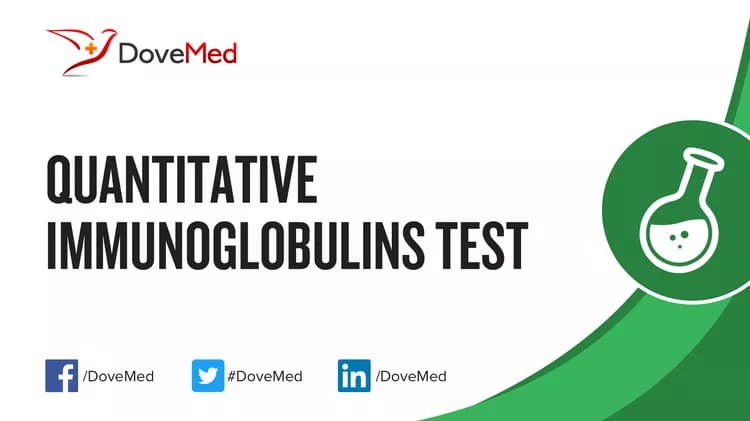What are the other Names for this Test? (Equivalent Terms)
- Immune Antibodies Test
- Immune Serum Globulin Test
- Immunoglobulin M (IgM) Test
What is Quantitative Immunoglobulins Test? (Background Information)
- Immunoglobulins (Igs) are a category of proteins produced by immune cells that aid in bodily defense against outside invaders. They recognize characteristic surface markings (antigens) and bind away the foreign object, before it can cause any damage to the body
- Immunoglobulins can either reside on the outside of cells, or freely circulate throughout the blood. When circulating in blood, they are also called antibodies
- Plasma cells are specialized immune cells that serve as antibody factories. When stimulated by the immune system, plasma cells can produce and secrete up to 100 million antibodies per hour
There are 5 main types of immunoglobulins, each with subtypes:
- Immunoglobulin M (IgM): IgM comprises 5% of the circulating antibodies. It is the first antibody produced, when a foreign antigen is encountered. Thus, a sharp rise in IgM is indicative of an acute infection
- Immunoglobulin G (IgG): IgG is the major circulating antibody, comprising 80% of antibodies in circulation
- IgG takes over, after IgM levels peak and start to decline. Thus, a rise in IgG is indicative of a chronic or past infection, or indicative of an immunization, such as a flu shot
- IgG is the “memory antibody” that serves as a catalog of immunity. As an example, it is part of the reason one is resistant to chicken pox, the second time around. IgG can also pass through the placenta, to endow the fetus with immunity benefits
- Immunoglobulin A (IgA): IgA comprises 15% of the circulating antibodies
- However, secretory IgA (sIgA) is by far the most prevalent in mucous secretions of the esophagus, intestines, salivary glands, and tear ducts
- sIgA binds away foreign matter, before it even reaches the mucous cells to cause harm. The mass is then sloughed away, coughed up, or “cried” out
- Immunoglobulin E (IgE): IgE is present in trace amounts and it plays an important role in the defense against parasites and allergens. IgE is measured during allergy testing
- Immunoglobulin D (IgD): IgD is present in trace amounts; its exact function is quite unknown
The Quantitative Immunoglobulins Test assesses the levels of the top 3 immunoglobulins - IgM, IgG, and IgA.
What are the Clinical Indications for performing the Quantitative Immunoglobulins Test?
Following are the clinical indicators for performing a Quantitative Immunoglobulins Test:
- Persistent flu-like symptoms
- Chronic diarrhea
- Monitoring the course of a known infection
- Adverse reaction to immunization
- Analyzing blood, prior to performing a blood transfusion
How is the Specimen Collected for Quantitative Immunoglobulins Test?
Sample required: Blood, cerebrospinal fluid (CSF), or saliva
Process:
- Insertion of a needle into an arm vein, for a blood sample
- Spinal tap for a CSF sample
- Saliva sample
Preparation required: None
What is the Significance of the Quantitative Immunoglobulins Test Result?
Excessive levels of all kinds of immunoglobulins (polyclonal immunoglobulins) may indicate:
- Acute or chronic infection
- Certain tumors
- Congenital cytomegalovirus (CMV) infection
- forCongenital rubella
- Congenital syphilis
- Congenital toxoplasmosis
- Hyperimmunization reaction
- Liver disorder or cirrhosis
- Rheumatoid arthritis
- Scleroderma
- Systemic lupus erythematosus
- Wiskott-Aldrich syndrome
Excessive levels of a particular kind of immunoglobulin (monoclonal immunoglobulins), often with a decrease in others, may indicate:
- Certain tumors
- Chronic lymphocytic leukemia (CLL)
- Lymphoma
- Monoclonal gammopathy of undetermined significance (MGUS)
- Multiple myeloma
- Waldenstrom’s macroglobinulinemia
Diminished levels of immunoglobulins may indicate:
- Hereditary (primary) deficiency due to:
- Giardiasis
- Agammaglobulinemia
- Common variable immunodeficiency (CVID)
- Wiskott-Aldrich syndrome
- Hyper-IgM syndrome
- Severe combined immunodeficiency (SCID)
- Ataxia telangiectasia
- Acquired (secondary) deficiency due to:
- Severe burns
- Medications, especially immunosuppressants
- Kidney disorder or kidney failure and nephrotic syndrome
- Advanced diabetes
- Protein-losing enteropathy
- Multiple sclerosis
The laboratory test results are NOT to be interpreted as results of a "stand-alone" test. The test results have to be interpreted after correlating with suitable clinical findings and additional supplemental tests/information. Your healthcare providers will explain the meaning of your tests results, based on the overall clinical scenario.
Additional and Relevant Useful Information:
- The Quantitative Immunoglobulins Test does not distinguish between subclasses of immunoglobulins. For this purpose, electrophoresis and immunofixation techniques are employed
- Elevated immunoglobulin levels may still indicate a compromised immune system. This may be because, in such cases, the immunoglobulins although present in large amounts, are defective and are unable to effectively defend the body
- Certain factors may interfere with the test and these include: Celiac disease, immunization, certain autoimmune disorders (if not being tested), narcotics, birth control, chemotherapy, and extreme temperatures
Certain medications that you may be currently taking may influence the outcome of the test. Hence, it is important to inform your healthcare provider, the complete list of medications (including any herbal supplements) you are currently taking. This will help the healthcare provider interpret your test results more accurately and avoid unnecessary chances of a misdiagnosis.
Related Articles
Test Your Knowledge
Asked by users
Related Centers
Related Specialties
Related Physicians
Related Procedures
Related Resources
Join DoveHubs
and connect with fellow professionals


0 Comments
Please log in to post a comment.